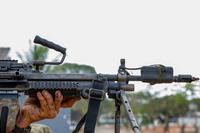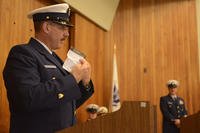The U.S. Air Force acknowledged it's expanding the number of drone surveillance missions flown by contractors in response to a chronic pilot shortage in the service.
Air Force Chief of Staff Gen. Mark Welsh discussed the issue Monday during a "State of the Air Force" briefing with reporters at the Pentagon.
"What we're talking about doing is expanding right now the use of contractors to actually operate government-owned systems for the near term until we can get our training pipeline mature enough that it can sustain the load over time," he said.
"That's what we're talking about in the current plus-up for contractors assisting us in the ISR business," he added. "We don't anticipate at all that they would be involved in kinetic activity or direct targeting of forces on the ground. They would be doing intelligence, surveillance and reconnaissance missions."
Welsh didn't specify any contractors by name, though General Atomics Aeronautical Systems Inc., the San Diego-based maker of the MQ-1 Predator and MQ-9 Reaper drone, has announced plans to set up a training academy for remotely piloted aircraft operators from the U.S. and allied countries.
The company last month reached a tentative agreement with the city of Grand Forks in North Dakota to set up an academy at Grand Sky, located on the Grand Forks Air Force Base, according to an Associated Press article.
The Air Force also last month said it will offer a new $15,000 annual bonus beginning in fiscal 2016 to entice more drone pilots to stay in the service.
The service announced the critical skills retention bonus for experienced operators of MQ-1 Predator and MQ-9 Reaper drones who agree to a five- or nine-year service extension. Many airmen in the field have been leaving due to stress and burnout, creating a shortage that has forced commanders to scale back missions.
With total values ranging from $75,000 to $135,000 -- half of which could be paid up front -- the so-called re-up bonus will be offered to drone pilots in the 18X specialty code with at least six years of experience. It will take effect Oct. 1 and supersede a previous temporary increase in monthly incentive pay.
Drone pilots typically fly between 900 and 1,100 hours a year, while fighter pilots generally fly about a quarter as much. Exacerbating the problem is a cultural divide within the service related to the ongoing stigmatization of unmanned aircraft operators, who are still judged by some of their peers as not being "real" pilots.








